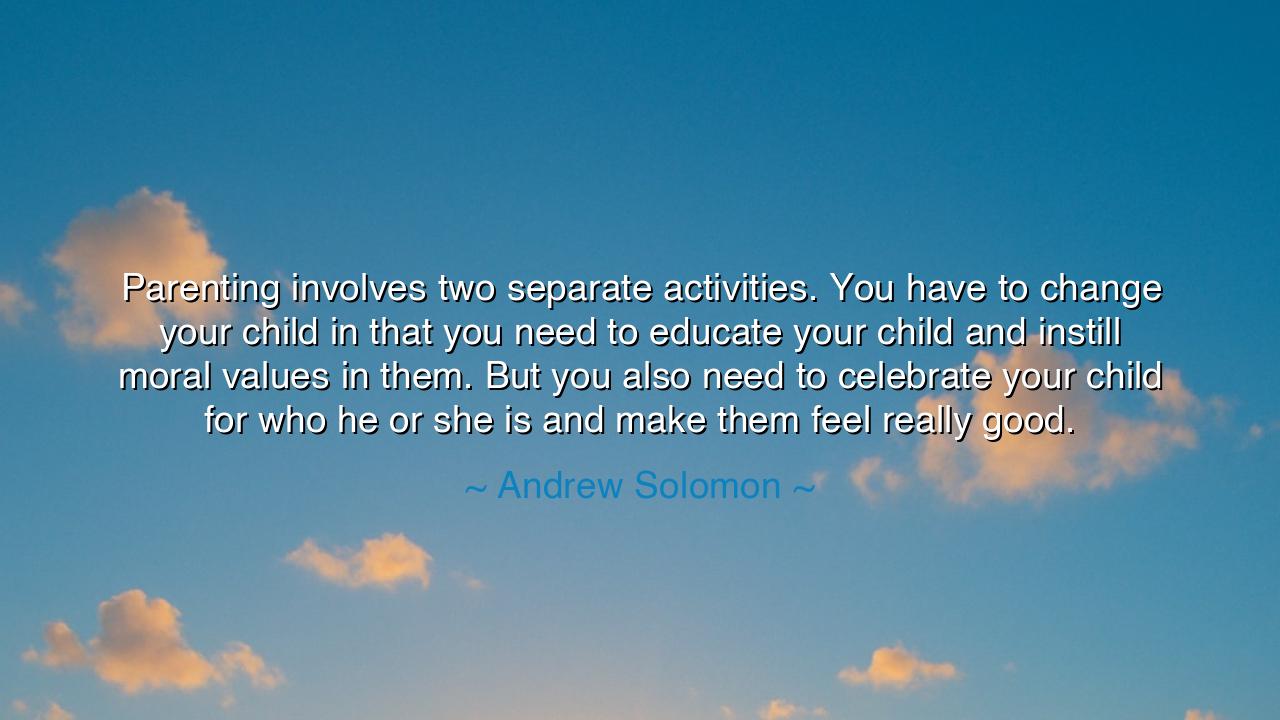
Parenting involves two separate activities. You have to change
Parenting involves two separate activities. You have to change your child in that you need to educate your child and instill moral values in them. But you also need to celebrate your child for who he or she is and make them feel really good.






In the words of Andrew Solomon, we find a truth both balanced and profound: “Parenting involves two separate activities. You have to change your child in that you need to educate your child and instill moral values in them. But you also need to celebrate your child for who he or she is and make them feel really good.” Here is the paradox of love made clear: the parent must shape, yet also honor; must guide, yet also rejoice; must demand growth, yet also affirm the unique soul that already is. To forget one half of this task is to wound, and to fulfill both is to raise not only a child, but a whole human being.
The ancients knew this balance. In the wisdom of Aristotle, education was the highest calling of the family, for it prepared children for virtue and for life within the polis. Yet the Hebrew psalmist reminds us that children are not possessions but gifts—“like arrows in the hand of a warrior”—each unique and to be treasured. Thus Solomon’s words echo the voices of the past: the duty of education and discipline must be joined with the sacred joy of celebration, lest the child be trained in virtue but starved of love.
History gives us luminous examples. Consider the case of John Adams, the second president of the United States, and his wife Abigail. They taught their son John Quincy Adams the importance of study, morality, and service—disciplining him in duty. Yet Abigail also celebrated her son’s individuality, writing letters that encouraged his talents and affirmed his worth. The result was not only a statesman but a man of integrity, shaped by both guidance and affirmation. This marriage of shaping and celebrating is what Solomon calls us toward.
The danger of imbalance is clear. A parent who seeks only to change the child, to educate, to correct, to mold, may succeed in raising a person of skill or discipline, but at the cost of joy, self-worth, and authenticity. Such children may achieve, but they will carry wounds of never being enough. Conversely, a parent who seeks only to celebrate without guiding, without instilling values, risks raising a child adrift, without compass or moral strength. True parenting requires both: the hand of the gardener who prunes, and the heart of the poet who delights in the blossom.
The meaning of Solomon’s reflection is deeply emotional, for it captures the yearning of every parent: to see their child grow into a better self, yet never lose the wonder of who they already are. It acknowledges that children are both clay to be molded and jewels to be admired. To hold both truths at once is the heroic labor of parenthood. For it is not easy to discipline while celebrating, to correct while affirming, to guide without crushing—but this is the work of love.
The lesson for us is clear. First, let us teach diligently, instilling wisdom, moral values, and resilience in our children. Second, let us celebrate them—not for what they may one day become, but for who they already are, in their laughter, their curiosity, their unique light. Third, let us remember that balance is not found in perfection, but in continual effort: some days shaping, some days celebrating, always returning to both.
O seekers of wisdom, remember this: the child is both seed and flower. The seed must be cultivated, disciplined, directed toward growth. But the flower must be admired, cherished, and celebrated for its beauty in the present moment. To neglect either is to fail the child. To unite both is to raise a human being whole and strong, ready not only to live but to love.
Thus, Andrew Solomon’s words endure as a compass for parents across the ages. Educate your children, yes; instill moral values, yes—but also celebrate them, honor their uniqueness, delight in their being. For in this sacred balance lies the true art of parenting, an art not of control, but of love that shapes and affirms in equal measure.






AAdministratorAdministrator
Welcome, honored guests. Please leave a comment, we will respond soon